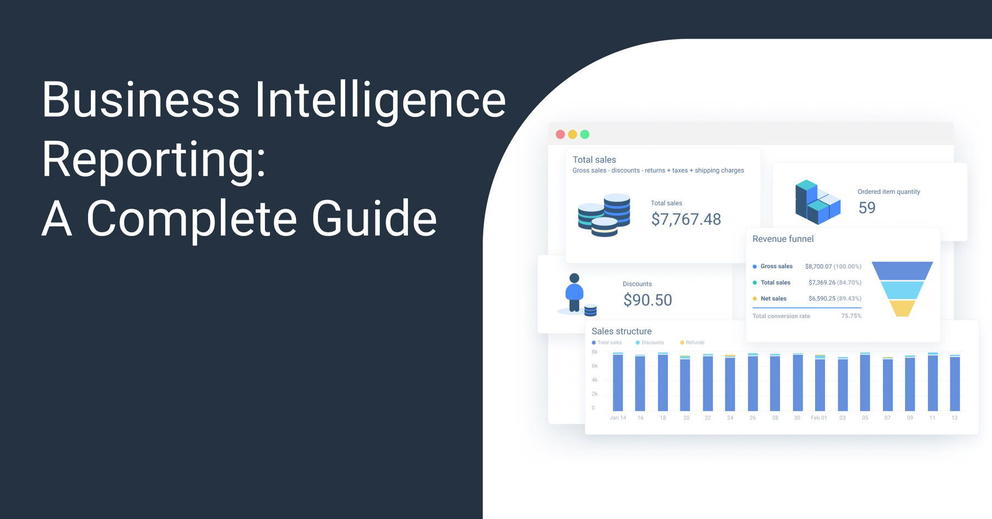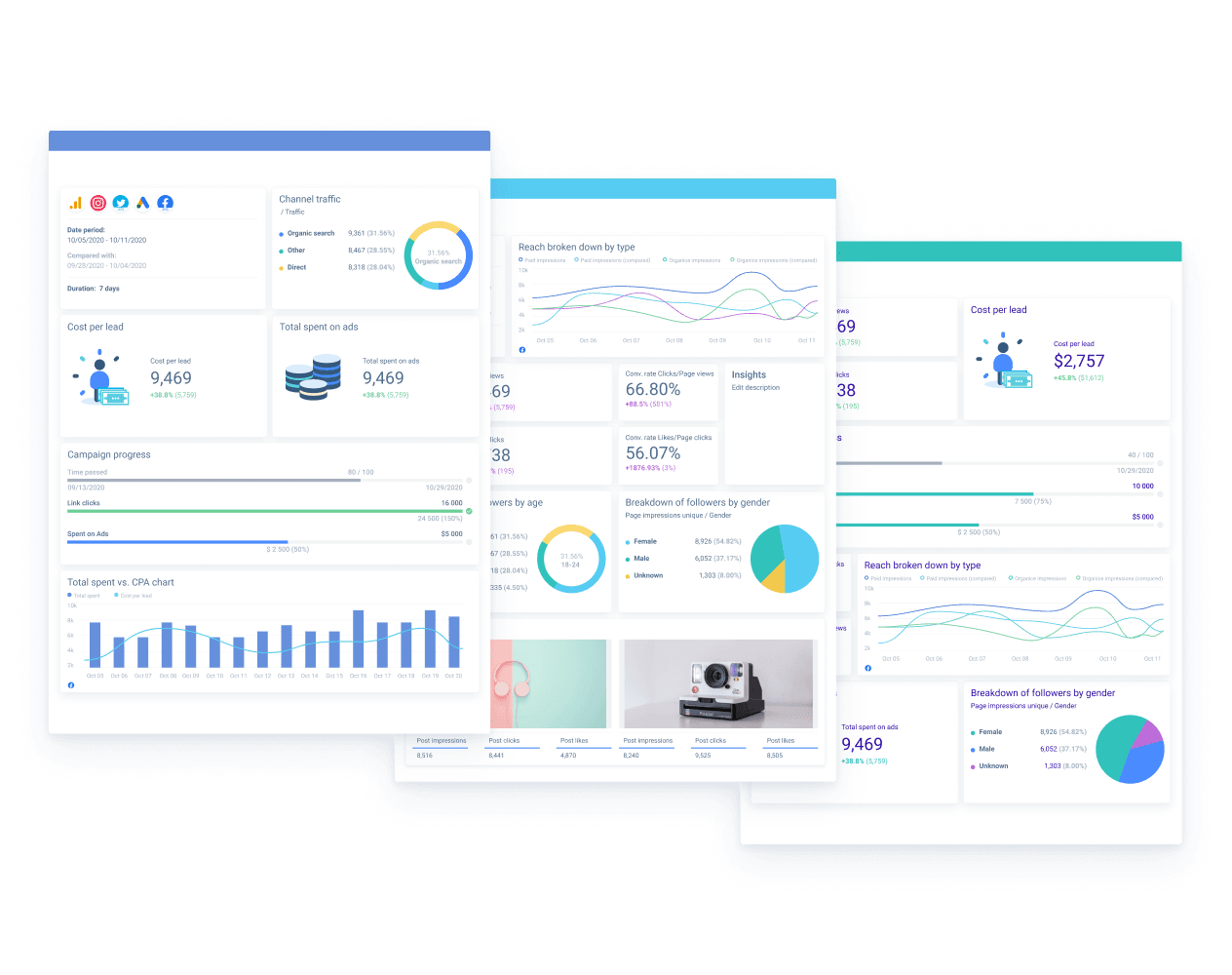Everything you need to know about BI reporting with the right tools
Focus on the fact that BI sounds complex, but it shouldn't be. It should be plug-and-play because it is crucial for the business decision-making process. And Whatagraph can help here.

Apr 20 2021 ● 6 min read

One of the main challenges in providing sound business intelligence is big data. To be specific, there is an abundance of raw data that we can funnel from multiple sources. However, without adequate data analysis tools or means of providing business intelligence, there is little use in aggregating data.
Business intelligence reporting or BI reporting plays a pivotal role in this since it empowers companies or businesses to gather and transform data more effectively. To be more specific, BI reporting allows us to create smart reports by relying on a variety of different software or tools. The article will focus on examining BI reporting, its benefits, and methods.
What Is BI Reporting?
BI reporting is the process of collecting data and analyzing it in order to acquire relevant insights, which are later used to provide observation and suggestions to decision-makers or managing boards. The idea is to empower users to act and create strategies that will have desired outcomes, given how they are data-driven.
Depending on what you are trying to achieve or how drastic changes you want to implement, you will decide just how much data needs to be gathered and on the number of angles, it needs to be examined. In other words, you might want to consider different variables or use different data interpretations before you create a BI report.
There are multiple advantages that companies can gain from business intelligence reporting. In general, acting on intel or creating well-informed decisions allows companies to maximize their chances of reaching target goals.
Goal and Purpose of BI reporting Tool
The goal of business intelligence reporting is pretty clear, as it's pretty much explained in the previous section. Relying on a business intelligence reporting tool allows companies to avoid costs like having a data analyst. The goal of the reporting tool is to streamline the process and speed up collection and analysis and at the same time provide relevant insights. This is why bi reporting tools are some of the most sought-after SaaS products.
Another goal or purpose is to eliminate the need for massive data storage capacity. Raw data can easily fill up your hard drive, and in the event, this business data is lost, you will lose valuable reports. Cloud-based solutions are often a go-to option, as they have the massive capacity and are very secure.
So far, there are plenty of reasons to go for this option, and yet there are more perks that you can enjoy by relying on bi software. You can have automated report generation paired with great data visualization. This is pretty much standard among quality BI solutions, so all you need to figure out if they follow business trends in terms of integration capabilities.
Benefits of Business Intelligence Reporting
So far, we have given only general benefits, so it would be useful to focus on more concrete use cases where BI reporting plays a major role.
1. Improving overall workflow efficiency
Automation, routine, and boosting efficiency, and delivering desired results are usually the main goals of the project managers. However, in order to do that, they need to examine different aspects of production, sales strategies, delivery, etc. So finding best practices for all of those steps and creating a well-oiled machine or system requires data analysis and BI reporting.
In this case, you would need to analyze the internal process and how customers behave to formulate the best practices. But relying on a central data source for multiple data pipelines would be the way to go if you wish to generate solid visual reports.
2. Implementation strategies
Coming up with creative solutions is only one part of the equation, as you also need sound implementation strategies. This implies you will need the performance history of a particular team and maybe a performance report on your competitors who have managed to do a better job. Simply by comparing reports you can find implementation strategies that are more likely to work.
More specifically, you will need to compare marketing campaign reports and sales efforts reports. And depending on the business model, you are likely to introduce other reports, like the website's bounce rate and conversion rate.
3. Using both real-time and historical data
Business Intelligence reporting tools make it easy for you to incorporate historical data and real-time data into a report and make necessary comparisons. If you were to use a tool like Whatagraph, you can effectively create pipelines from multiple data sources throughout their integration features and monitor data in real-time. If you rely on the same tool for a longer time, compiling historical data becomes significantly easier, and you can also generate detailed and visual reports.
Using real-time reports also has many advantages. For example, knowing when someone mentions your brand name allows you to follow the thread, see if there is any negative news that is emerging, or simply concerns that you can easily address.
4. Customer analysis and behavioural prediction
The most lucrative benefit of business intelligence reporting is definitely an insight into customers’ behaviour. It allows them to predict trends and also figure out why some user groups do not find their offer or product appealing. Any business that wants to grow prioritizes strategies that can get them, new customers or new users.
It's no surprise that emotion or emotional need can be a driving force behind the business decision-making process. Therefore, knowing what motivates your buyers is crucial to figuring future features and sales pitches for your product.
Another reason how customer analysis helps is costs optimization and product pricing. You might be able to see which features are often extra costs as no one pays attention to them or they do not play an important selling point and find out how increases or decreases in prices affect your sales number and overall revenue.
Overall there are multiple other benefits to bi reporting tools and practices, like optimizing procurement, hiring process, or enhancing the quality of data overall. But they are only as limited as your imagination since finding new and creative ways to implement this technology is something that is happening on a daily basis around the world.
FAQ
What is a BI report?
A business intelligence or BI report is a document or content that is generated through data visualization. It details relevant information that was obtained through data analysis and needs to help its users make well-informed decisions.
What is the purpose of BI reporting?
Help its users make data-driven decisions, which can improve business operations, or serve as a guide for sales strategies, etc. This is achieved through collecting and analyzing data and turning the information into data insights.
What are the two types of BI reports?
- Strategic Business Intelligence - Has a goal of improving business processes and helps the managing board decide in which direction the company should go.
- Operational Business Intelligence - As the name suggests, it is associated with the organizational and operational process. This is real-time data reporting as it is aimed at customer service personnel, like when an error occurs or if a potential customer has questions.
Published on Apr 20 2021

WRITTEN BY
Indrė Jankutė-CarmaciuIndrė is a copywriter at Whatagraph with extensive experience in search engine optimization and public relations. She holds a degree in International Relations, while her professional background includes different marketing and advertising niches. She manages to merge marketing strategy and public speaking while educating readers on how to automate their businesses.